Books about Shakespeare and the Environment, in chronological order by release date
We list featured plays for each book; do a screen search by play title to find books that address a play you are interested in.
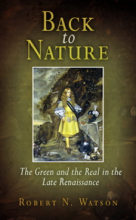
Focus Plays: Comedies
GABRIEL EGAN Green Shakespeare: From Ecopolitics to Ecocriticism (Palgrave, 2006)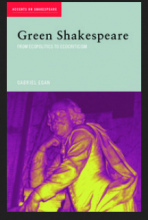
Ecocriticism, a theoretical movement examining cultural constructions of Nature in their social and political contexts, is making an increasingly important contribution to our understanding of Shakespeare’s plays. Gabriel Egan's Green Shakespeare presents: an overview of the concept of ecocriticism; detailed ecocritical readings of Henry V, Macbeth, As You Like It, Antony & Cleopatra, King Lear, Coriolanus, Pericles, Cymbeline,The Winter’s Tale and The Tempest; analysis of themes such as nature and human society; food and biological nature; the supernatural and the weather; a bold argument for a contemporary ‘EcoShakespeare’, taking into account the environmental and political implications of globalization and intellectual property laws.
Crossing the boundaries of literary and cultural studies to draw in politics, philosophy and ecology, this volume not only introduces one of the most lively areas of contemporary Shakespeare studies, but also puts forward a convincing case for Shakespeare’s continuing relevance to contemporary theory.
Focus Plays: Henry V, Macbeth, As You Like It, Antony and Cleopatra, King Lear, Coriolanus, Pericles, Cymbeline, The Winter’s Tale, The Tempest
STEVE MENTZ At the Bottom of Shakespeare’s Ocean (Continuum, 2009)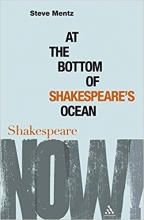
Publisher’s Description
We need a poetic history of the ocean, and Shakespeare can help us find one. There's more real salt in the plays than we might expect. Shakespeare's dramatic ocean spans the God-sea of the ancient world and the immense blue vistas that early modern mariners navigated. Throughout his career, from the opening shipwrecks of The Comedy of Errors through The Tempest, Shakespeare's plays figure the ocean as shocking physical reality and mind-twisting symbol of change and instability. To fathom Shakespeare's ocean - to go down to its bottom - this book's chapters focus on different things that humans do with and in and near the sea: fathoming, keeping watch, swimming, beachcombing, fishing, and drowning.
Mentz also sets Shakespeare's sea-poetry against modern literary sea-scapes, including the vast Pacific of Moby-Dick, the rocky coast of Charles Olson's Maximus Poems, and the lyrical waters of the postcolonial Caribbean. Uncovering the depths of Shakespeare's maritime world, this book draws out the centrality of the sea in our literary culture.
Focus Plays: Tempest, King Lear, Othello, The Comedy of Errors, Twelfth Night, Pericles, Timon of Athens
SIMON C. ESTOK Ecocriticism and Shakespeare: Reading Ecophobia (Palgrave, 2011)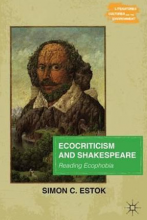
Publisher’s Description
This book offers the term 'ecophobia' as a way of understanding and organizing representations of contempt for the natural world. Estok argues that this vocabulary is both necessary to the developing area of ecocritical studies and for our understandings of the representations of 'Nature' in Shakespeare.
World Shakespeare Bibliography entry extract: From an ecocritical perspective, examines ecophobia ("contempt for the natural world") in Shakespeare, with attention to the fear of nature in King Lear; to the "relationships between ecophobia, displacement, and voice" in Coriolanus; to "relationships among social resistance, environmental ethics, and matters of disease" in 2 Henry IV and 2 Henry VI; to hostile geographies (including cannibalism in Pericles); to the nexus of "disgust, pollution, and gender" in Winter's Tale; to how "discourses of madness form a foundational base on which much Shakespearean exoticism and otherness is grounded"; and to sleep as "an interstitial space between 'the human' and 'Nature.'"
Focus Plays: Lear, Coriolanus, Henry IV par 2, Henry VI part 2, Othello, Pericles
LYNNE BRUCKNER and DAN BRAYTON, editors, Ecocritical Shakespeare (Routledge, 2011)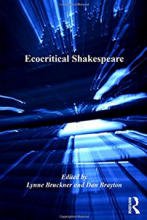
Publisher’s Description
Can reading, writing about, and teaching Shakespeare contribute to the health of the planet? To what degree are Shakespeare's plays anthropocentric or ecocentric? What is the connection between the literary and the real when it comes to ecological conduct? This collection, engages with these pressing questions surrounding ecocritical Shakespeare, in order to provide a better understanding of where and how ecocritical readings should be situated. The volume combines multiple critical perspectives, juxtaposing historicism and presentism, as well as considering ecofeminism and pedagogy; and addresses such topics as early modern flora and fauna, and the neglected areas of early modern marine ecology and oceanography. Concluding with an assessment of the challenges-and necessities-of teaching Shakespeare ecocritically, Ecocritical Shakespeare not only broadens the implications of ecocriticism in early modern studies, but represents an important contribution to this growing field.
Focus Plays: A Midsummer Night’s Dream, Antony and Cleopatra, The Taming of the Shrew, Merry Wives of Windsor, Winter’s Tale, Macbeth, Hamlet
DOWNING CLESS Ecology and Environment in European Drama (Routledge, 2011)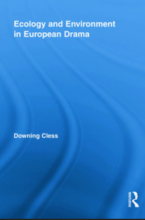
Publisher’s Description
Looking at European drama through an ecological lens, this book chronicles nature and the environment as primary topics in major plays from ancient to recent times. Cless focuses on the few, yet well-known plays in which nature is at stake in the action or the environment is a dramatic force. Though theater predominantly explores human and cultural themes, these plays fully display the power of the other-than-human world and its endangerment during the history of Europe. While offering a broad overview, the book features extensive case studies of several playwrights, plays, and eco-theater productions: Aristophanes’ The Birds, Marlowe’s Doctor Faustus, Shakespeare’s A Midsummer Night’s Dream and The Tempest, and Giraudoux’s The Madwoman of Chaillot. In each case, Cless connects nature in the play to nature in the life of the playwright based on biographical research into the understanding of natural philosophy and awareness of the immediate environment that influenced the specific play. The book is one of the first of its kind in a growing field of ecocriticism and emerging eco-studies of theater.
Focus Plays: A Midsummer Night’s Dream, The Tempest
DAN BRAYTON Shakespeare's Ocean: An Ecocritical Exploration (University of Virginia Press, 2012)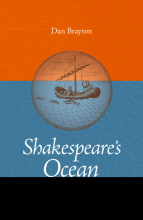
Publisher's Description
Study of the sea--both in terms of human interaction with it and its literary representation--has been largely ignored by ecocritics. In Shakespeare’s Ocean, Dan Brayton foregrounds the maritime dimension of a writer whose plays and poems have had an enormous impact on literary notions of nature and, in so doing, plots a new course for ecocritical scholarship.
Shakespeare lived during a time of great expansion of geographical knowledge. The world in which he imagined his plays was newly understood to be a sphere covered with water. In vital readings of works ranging from The Comedy of Errors to the valedictory The Tempest, Brayton demonstrates Shakespeare’s remarkable conceptual mastery of the early modern maritime world and reveals a powerful benthic imagination at work.
Focus plays: Comedy of Errors, Twelfth Night, Romeo and Juliet, Hamlet, Pericles, Tempest and others
ROSEMARY GABY Open-air Shakespeare Under Australian Skies (Palgrave, 2014)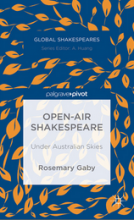
Publisher’s Description
Many people today first encounter staged Shakespeare in an open-air setting. This book traces the history of open-air Shakespeares in Australia to investigate why the anomaly of adapting 400-year old plays under Australian skies exerts such a strong appeal.
From GoodReads.com:
Many people today first encounter staged Shakespeare in an open-air setting. In Australia, picnic Shakespeares seem particularly suited to the predilections of contemporary audiences and the plays have been performed in a remarkably varied range of sites. Shakespeare has been transported to gardens, parks, caves, mountains and beaches all over the country, in a place that for Shakespeare and his contemporaries was completely unknown. Why does the anomaly of performing Shakespeare in Australian space exert such a strong appeal? This book traces the history of open-air Shakespeare production in Australia from the beginning of the twentieth century to the present day and suggests that the industry reflects important changes in the ways contemporary Australians relate to both their environment and to Shakespeare. It provides striking evidence of the diversity of localised responses to Shakespeare that exist outside Britain, and contributes to our understanding of Shakespeare's changing global impact.
CHARLOTTE SCOTT Shakespeare's Nature: From Cultivation to Culture (Oxford University Press, 2014)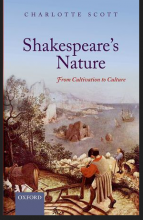
Publisher's Description
Shakespeare's Nature offers the first sustained account of the impact of the language and practice of husbandry on Shakespeare's work. It shows how the early modern discourse of cultivation changes attitude to the natural world, and traces the interrelationships between the human and the natural worlds in Shakespeare's work through dramatic and poetic models of intervention, management, prudence and profit. Ranging from the Sonnets to The Tempest, the book explains how cultivation of the land responds to and reinforces social welfare, and reveals the extent to which the dominant industry of Shakespeare's time shaped a new language of social relations. Beginning with an examination of the rise in the production of early modern printed husbandry manuals, Shakespeare's Nature draws on the varied fields of economic, agrarian, humanist, Christian and literary studies, showing how the language of husbandry redefined Elizabethan attitudes to both the human and non-human worlds. In a series of close readings of specific plays and poems, this book explains how cultivation forms and develops social and economic value systems, and how the early modern imagination was dependent on metaphors of investment, nurture and growth. By tracing this language of intervention and creation in Shakespeare's work, this book reveals a fundamental discourse in the development of early modern social, political and personal values.
Focus plays: Henry V, Macbeth, Winter's Tale, Tempest, Sonnets
RANDALL MARTIN Shakespeare and Ecology (Oxford University Press, 2015)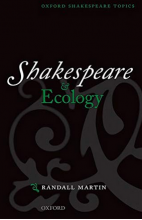
Publisher’s Description
Shakespeare and Ecology is the first book to explore the topical contexts that shaped the environmental knowledge and politics of Shakespeare and his audiences. Early modern England experienced unprecedented environmental challenges including climate change, population growth, resource shortfalls, and habitat destruction which anticipate today's globally magnified crises. Shakespeare wove these events into the poetic textures and embodied action of his drama, contributing to the formation of a public ecological consciousness, while opening creative pathways for re-imagining future human relationships with the natural world and non-human life.
This book begins with an overview of ecological modernity across Shakespeare's work before focusing on three major environmental controversies in particular plays: deforestation in The Merry Wives of Windsor and The Tempest; profit-driven agriculture in As You Like It; and gunpowder warfare and remedial cultivation in Henry IV Parts One and Two, Henry V, and Macbeth. A fourth chapter examines the interdependency of local and global eco-relations in Cymbeline, and the final chapter explores Darwinian micro-ecologies in Hamlet and Antony and Cleopatra. An epilogue suggests that Shakespeare's greatest potential for mobilizing modern ecological ideas and practices lies in contemporary performance.
Shakespeare and Ecology illuminates the historical antecedents of modern ecological knowledge and activism, and explores Shakespeare's capacity for generating imaginative and performative responses to today's environmental challenges.
Focus Plays: The Merry Wives of Windsor, The Tempest, As You Like It, Henry IV Parts 1 and 2, Henry V, Macbeth, Cymbeline, Hamlet, and Antony and Cleopatra
GABRIEL EGAN Shakespeare and Ecocritical Theory (Arden 2015)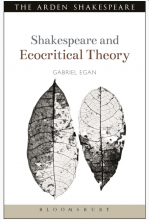
Publisher’s Description
Combining the latest scientific and philosophical understanding of humankind's place in the world with interpretative methods derived from other politically inflected literary criticism, ecocriticism is providing new insights into literary works both ancient and modern. With case-study analyses of the tragedies, comedies, histories and late romances, this book is a wide-ranging introduction to reading Shakespeare in the light of contemporary ecocritical theory.
Focus Plays: ranges evenly across most of Shakespeare’s works
TOM MACFAUL Shakespeare and the Natural World (Cambridge University Press, 2015)
Publisher’s Description
Exploring the rich range of meanings that Shakespeare finds in the natural world, this book fuses ecocritical approaches to Renaissance literature with 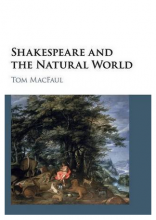 recent thinking about the significance of religion in Shakespeare's plays. MacFaul offers a clear introduction to some of the key problems in Renaissance natural philosophy and their relationship to Reformation theology, with individual chapters focusing on the role of animals in Shakespeare's universe, the representation of rural life, and the way in which humans' consumption of natural materials transforms their destinies. These discussions enable powerful new readings of Shakespeare's plays, including A Midsummer Night's Dream, As You Like It, King Lear, Macbeth, The Tempest, The Winter's Tale, and the history plays. Proposing that Shakespeare's representation of the relationship between man and nature anticipated that of the Romantics, this volume will interest scholars of Shakespeare studies, Renaissance drama and literature, and ecocritical studies of Shakespeare.
recent thinking about the significance of religion in Shakespeare's plays. MacFaul offers a clear introduction to some of the key problems in Renaissance natural philosophy and their relationship to Reformation theology, with individual chapters focusing on the role of animals in Shakespeare's universe, the representation of rural life, and the way in which humans' consumption of natural materials transforms their destinies. These discussions enable powerful new readings of Shakespeare's plays, including A Midsummer Night's Dream, As You Like It, King Lear, Macbeth, The Tempest, The Winter's Tale, and the history plays. Proposing that Shakespeare's representation of the relationship between man and nature anticipated that of the Romantics, this volume will interest scholars of Shakespeare studies, Renaissance drama and literature, and ecocritical studies of Shakespeare.
Focus Plays: A Midsummer Night's Dream, As You Like It, King Lear, Macbeth, The Tempest, The Winter's Tale
CRAIG DIONNE Posthuman Lear: Reading Shakespeare in the Anthropocene (Punctum Books, 2016)
Publisher’s Description
Approaching King Lear from an eco-materialist perspective, Posthuman Lear examines how the shift in Shakespeare’s tragedy from court to stormy heath activates a different sense of language as tool-being — from that of participating in the flourish of aristocratic prodigality and circumstance, to that of survival and pondering one’s interdependence with a denuded world. Dionne frames the thematic arc of Shakespeare’s tragedy about the fall of a king as a tableaux of our post-sustainable condition. For Dionne, Lear’s progress on the heath works as a parable of flat ontology.
At the center of Dionne’s analysis of rhetoric and prodigality in the tragedy is the argument that adages and proverbs, working as embodied forms of 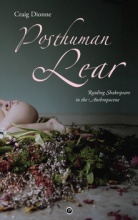 speech, offer insight into a nonhuman, fragmentary mode of consciousness. The Renaissance fascination with memory and proverbs provides an opportunity to reflect on the human as an instance of such enmeshed being where the habit of articulating memorized patterns of speech works on a somatic level. Dionne theorizes how mnemonic memory functions as a potentially empowering mode of consciousness inherited by our evolutionary history as a species, revealing how our minds work as imprinted machines to recall past prohibitions and useful affective scripts to aid in our interaction with the environment. The proverb is that linguistic inscription that defines the equivalent of human-animal imprinting, where the past is etched upon collective memory within ‘adagential” being that lives on through the generations as autonomic cues for survival.
speech, offer insight into a nonhuman, fragmentary mode of consciousness. The Renaissance fascination with memory and proverbs provides an opportunity to reflect on the human as an instance of such enmeshed being where the habit of articulating memorized patterns of speech works on a somatic level. Dionne theorizes how mnemonic memory functions as a potentially empowering mode of consciousness inherited by our evolutionary history as a species, revealing how our minds work as imprinted machines to recall past prohibitions and useful affective scripts to aid in our interaction with the environment. The proverb is that linguistic inscription that defines the equivalent of human-animal imprinting, where the past is etched upon collective memory within ‘adagential” being that lives on through the generations as autonomic cues for survival.
Dionne writes: “No doubt the book wears a geographical and discursive motley because of the context of its making, being a product of an overseas sabbatical year in Tokyo. Reading Shakespeare’s King Lear while sitting under three tiers of incessantly busy freeway overpasses in one of the world’s most densely populated cities, in a sea of Roppongi neon and 50-foot live-feed Sony ads, where Japan’s techno-futurism sounds over the wave of urban commuters dressed in the weird nostalgia that defines Tokyo fashion — sleek faux-50s-American business suits or the cosplay of Lolita teeny bop dyed hair — all the while a few miles north, the Fukushima nuclear power plant silently leaks radiation into the Pacific. Lotus eaters lost in the funhouse? Or survivors clinging to outmoded rituals in the face of madness? In this context, reading for the kernel of Shakespeare’s philosophy of the human in his great tragedy can feel a bit unsettling, like that of a posthuman Rorschach test. (Or a bad acid trip flashback of a Rorschach test). No excuse, I suppose, but in this setting the interpretation of cosmic decay and ecological catastrophe in Shakespeare’s great tragedy does not feel necessarily forced. Only suspiciously apparent.”
Dionne’s reimagining of this tragedy is important in the way it places Shakespeare’s central existential questions — the meaning of familial love, commitments to friends, our place in a secular world — in a new relation to the main question of surviving within fixed environmental limits. Along the way, Dionne reflects on the larger theoretical implications of recycling the old historicism of early modern culture to speak to an eco-materialism, and why the modernist textual aesthetics of the self-distancing text seems inadequate when considering the uncertainty and trauma that underscores life in a post-sustainable culture. Dionne’s final appeal is to “repurpose” our fatalism in the face of ecological disaster.
ANNE BARTON The Shakespearean Forest (Cambridge University Press, 2017)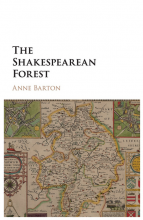
Publisher's Description
The Shakespearean Forest, Anne Barton's final book, uncovers the pervasive presence of woodland in early modern drama, revealing its persistent imaginative power. The collection is representative of the startling breadth of Barton's scholarship: ranging across plays by Shakespeare (including Titus Andronicus, As You Like It, Macbeth, The Two Gentlemen of Verona and Timon of Athens) and his contemporaries (including Jonson, Dekker, Lyly, Massinger and Greene), it also considers court pageants, treatises on forestry and chronicle history. Barton's incisive literary analysis characteristically pays careful attention to the practicalities of performance, and is supplemented by numerous illustrations and a bibliographical essay exploring recent scholarship in the field. Prepared for publication by Hester Lees-Jeffries, featuring a Foreword by Adrian Poole and an Afterword by Peter Holland, the book explores the forest as a source of cultural and psychological fascination, embracing and illuminating its mysteriousness.
Focus Plays: Titus Andronicus, As You Like It, Macbeth, The Two Gentlemen of Verona, Timon of Athens
REBECCA LAROCHE and JENNIFER MUNROE Shakespeare and Ecofeminist Theory (Arden, 2017)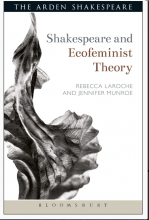
Publisher’s Description
Ecofeminism has been an important field of theory in philosophy and environmental studies for decades. It takes as its primary concern the way the relationship between the human and nonhuman is both material and cultural, but it also investigates how this relationship is inherently entangled with questions of gender equity and social justice.
Shakespeare and Ecofeminist Theory engagingly establishes a history of ecofeminist scholarship relevant to early modern studies, and provides a clear overview of this rich field of philosophical enquiry. Through fresh, detailed readings of Shakespeare's poetry and drama, this volume is a wholly original study articulating the ways in which we can better understand the world of Shakespeare's plays, and the relationships between men, women, animals, and plants that we see in them.
Focus Plays: All’s Well That Ends Well, The Taming of the Shrew, Macbeth, King Lear
JENNIFER MAE HAMILTON 'This Contentious Storm': An Ecocritical and Performance History of King Lear (Bloomsbury, 2018)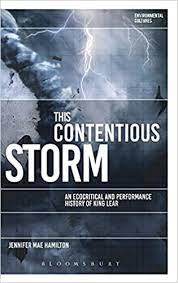
This book reads interpretations of the storm in Lear throughout history, considering how it has had emotional, cosmological, and apocalyptic valences. The second half of it traces the performance history of the play from early modern times to 2016, looking at how psychological uses of it gradually gave way to more ecocritical approaches and ideas.
Focus Play: King Lear
SOPHIE CHIARI Shakespeare’s Representation of Weather, Climate and Environment: The Early Modern ‘Fated Sky’ (Edinburgh University Press, 2019)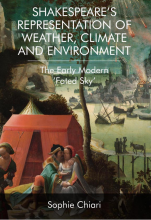
Publisher’s Description
While ecocritical approaches to literary texts receive more and more attention, climate-related issues remain fairly neglected, particularly in the field of Shakespeare studies. This monograph explores the importance of weather and changing skies in early modern England while acknowledging the fact that traditional representations and religious beliefs still fashioned people’s relations to meteorological phenomena. At the same time, a growing number of literati stood against determinism and defended free will, thereby insisting on man’s ability to act upon celestial forces. Yet, in doing so, they began to give precedence to a counter-intuitive approach to Nature. Sophie Chiari argues that Shakespeare reconciles the scholarly views of his time with more popular ideas rooted in superstition and that he promotes a sensitive, pragmatic understanding of climatic events. She pays particular attention to A Midsummer Night’s Dream, Romeo and Juliet, As You Like It, Othello, King Lear, Anthony and Cleopatra, and The Tempest. Taking into account the influence of classical thought, each of the book’s seven chapters emphasises specific issues (e.g. cataclysmic disorders, the dog days’ influence, freezing temperatures, threatening storms) and considers the way climatic events were presented on stage and how they came to shape the production and reception of Shakespeare’s drama.
Focus Plays: A Midsummer Night’s Dream, Romeo and Juliet, As You Like It, Othello, King Lear, Anthony and Cleopatra, and The Tempest.
TODD ANDREW BORLIK Literature and Nature in the English Renaissance: An Ecocritical Anthology (Cambridge University Press, 2019)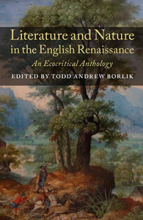
Publisher’s Description
Featuring over two hundred nature-themed texts spanning the disciplines of literature, science and history, this sourcebook offers an accessible field guide to the environment of Renaissance England, revealing a nation at a crossroads between its pastoral heritage and industrialized future. Carefully selected primary sources, each modernized and prefaced with an introduction, survey an encyclopaedic array of topographies, species, and topics: from astrology to zoology, bear-baiting to bee-keeping, coal-mining to tree-planting, fen-draining to sheep-whispering. The familiar voices of Spenser, Shakespeare, Jonson, and Marvell mingle with a diverse chorus of farmers, herbalists, shepherds, hunters, foresters, philosophers, sailors, sky-watchers, and duchesses - as well as ventriloquized beasts, trees, and rivers. Lavishly illustrated, the anthology is supported by a lucid introduction that outlines and intervenes in key debates in Renaissance ecocriticism, a reflective essay on ecocritical editing, a bibliography of further reading, and a timeline of environmental history and legislation drawing on extensive archival research.
EVELYN O’MALLEY Weathering Shakespeare: Audiences and Open-Air Performance (Arden, 2020)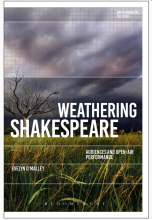
Publisher’s Description
From The Pastoral Players' 1884 performance of As You Like It to contemporary site-specific productions activist interventions, there is a rich history of open air performances of Shakespeare's plays beyond their early modern origins. Weathering Shakespeare reveals how new insights from the environmental humanities can transform our understanding of this popular performance practice. Drawing on audience accounts of outdoor productions of those plays most commonly chosen for open air performance – including A Midsummer Night's Dream and The Tempest – the book examines how performers and audiences alike have reacted to unpredictable natural environments.
Focus Plays: As You Like It, A Midsummer Night’s Dream, The Tempest
SOPHIE CHIARI, editor. Ecrire la catastrophe: L'Angleterre à l'épreuve des éléments (XVIe - XVIIIe siècle). Presses Universitaires Blaise Pascal, 2020.
TIMOTHY RYAN DAY Shakespeare and the Evolution of the Human Umwelt: Adpat, Interpret, Mutate (Routledge, 2021)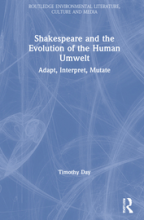
Publisher’s Description
Shakespeare and the Evolution of the Human Umwelt brings together research on Shakespeare, biosemiotics, ecocriticism, epigenetics and actor network theory as it explores the space between nature and narrative in an effort to understand how human bodies are stories told in the emergent language of evolution, and how those bodies became storytellers themselves.
Chapters consider Shakespeare’s plays and contemporary works, such as those of Barbara Kingsolver and Margaret Atwood, or productions for which Shakespeare is a genetic forebear, as evolutionary artefacts which have helped to shape the human umwelt—the species-specific linguistic habitat that humans share in common. The work investigates the juncture where semisphere meets biosphere and illuminates the role that narrative plays in our construction of the world we occupy. The plays of Shakespeare, as works that have had unparalleled cultural diffusion, are uniquely situated to speak to the ways in which ideas and the texts they use as vehicles are always material, always environmental, and always alive. The book discusses Shakespeare’s works as vital nodes in our cultural, historical, moral and philosophical networks, but also as environmental actors in and of themselves. Plays are presented alternately as digitally encoded bits of culture awaiting their connection to an analog world, or as bacteria interacting with living organisms in both productive and destructive ways, altering their structure and creating new meaning through movement that is simultaneously biological and poetic.
This book will be of great interest to students and scholars of ecocriticism looking to model ecocritical readings and bridge gaps between scientific, philosophical and literary thinking.
Focus Plays: A Midsummer Night’s Dream, Macbeth, Hamlet, The Tempest
TODD BORLIK. Shakespeare Beyond the Green World: Drama and Ecopolitics in Jacobean Britain. Oxford: Oxford University Press. 2023.
LIZ OAKLEY-BROWN. Shakespeare on the Ecological Surface. Oxford and New York: Routledge, Spotlight on Shakespeare. 2024.
DAROY, ALYSE and PAUL PRESCOTT. Shakespeare, Ecology, and Adaptation. London: Arden Bloomsbury, 2025.
BROKAW, KATHERINE STEELE and ELIZABETH FREESTONE. Performing Shakespeare on an Endangered Planet. Cambridge: Cambridge University Press, 2025.

